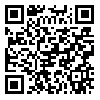BibTeX | RIS | EndNote | Medlars | ProCite | Reference Manager | RefWorks
Send citation to:
URL: http://bloodjournal.ir/article-1-349-en.html
Abstract
Background and Objectives
The lack of eligible volunteers in many countries has turned into a crisis in blood services. So it is necessary to prepare purposive programs to meet ever increasing demands for blood. The goal of this research is to determine the knowledge level of eligible donors and study their attitude about blood donation.
Materials and Methods�
This study was conducted at two stages. At the first stage, a pilot study on 60 eligible blood donors was done they were instructed to answer open-ended questions in the questionnaire. At the second stage, data collection was done from July to October 2006 on 1130 non-blood donors living in Mashhad who were eligible for blood donation. These potential donors were selected by the two stage probability sampling method.
Results�
Less than 30% of the cases had adequate knowledge about blood donation. There is a significant relationship between location, age, education, occupation and social status with knowledge of blood donation (p<0.05). Statistical results show that the attitude towards blood donation is mostly positive. The highest positive attitude towards encouraging factors was estimated to be 83% and the highest negative attitude towards the negative factors 58%.
Conclusions
In order to increase voluntary blood donation, we have to change the negative attitude towards blood donation by increasing relevant knowledge.
Key words : Blood Donors, Knowledge, Attitude
| Rights and permissions | |
 |
This work is licensed under a Creative Commons Attribution-NonCommercial 4.0 International License. |





